In 1964 Sir Stephen and Lady Virginia Courtauld funded an agricultural training school named ‘Kukwanisa’ in the Tsonzo area of Nyanga which was established for small holder farmers in the area. Initially it was an outstandingly successful venture but it was sadly destroyed during the war years. It has been the wish of the NTZ to re-establish the training school.
In 2016 Mr Dominik Collenberg of Organic Africa, in a Joint Venture with Acumen (who undertook the major refurbishment of La Rochelle and now manages the boutique country house), approached the NTZ with a view to enter into a long term successful partnership establishing an agricultural training centre of excellence at La Rochelle. The centre will offer courses in sustainable organic farming for small scale farmers in southern Africa. Needless to say this is an exciting opportunity for all the organisations involved and for Zimbabwe. So the NTZ was proud to invite Mr Dominik Collenberg to speak at its 44th AGM held on the 29th July 2017. Dominik holds a Masters in Organic Farming and Masters in Economic of Development which means that he has the expertise to implement the proposed project and in addition he has gained many years of experience in his professional field.
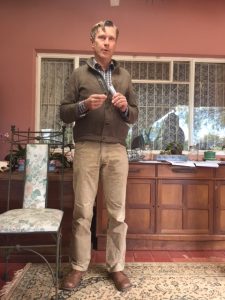 Dominik addressing the meeting
Dominik addressing the meeting
Dominik outlined the proposed project and explained his vision is in alignment with the NTZ one: that an agricultural training centre would be built at La Rochelle and the existing county house would be expanded as per the wishes of Sir Stephen and Lady Virginia. The centre would also establish trial plots whereby student would have hands on teaching experience as well. He said that he already had secured an export market for the crops grown by the small scale farmers from a company, who are the world leading herbal tea producer based in Germany. They are a family run business with expertise in mixing premium quality herbal teas, using various extracts such as aniseed and horehound, lemon balm, mint, cinnamon and lemongrass. The extracts are mixed with a selection of botanicals (over 200) to produce herbal and fruit infusions, medicinal teas, flavoured black and green teas, herbal powders, botanicals, herbal, fruit and tea extracts, decaffeinated teas, tea flavours, active phytopharmaceutical ingredients and nutritional supplements. Their end product is sold to tea manufactures such as Lipton.
Only quality products produced by certified production methods and sustainably produced botanicals are needed. The herbal raw materials are grown, harvested and collected in a way that conserves Nature so that the diversity of resources will continue be available to future generations. Of great importance to them is responsible economic activity and they nurture long-term, fair relationships with business partners, insist on controlled, integrated cultivation and promote social and cultural projects.
Dominik then went on to talk about his company called Organic Africa who focus on organic production and said that they are the only company certified in organic fair trade products in Zimbabwe. They are also the only company in southern Africa whereby its small scale farmers have their land certified and so are able to produce high quality herbs for export. Which as you can imagine, is no mean feat! The certification means that their farmers produce high value crop (low volume) and so they are paid at a premium higher price. He added that most of the farmers are women.
In the past Organic Africa has carried out training of famers under the shelter of a tree, looking to the future they want to build the agricultural training centre will really give them a chance to understand and have hands on practice experience which will lead to more small scale farmers being trained at a high level. The training will show how the farmers can grow crops without using any chemicals or fertilisers and how to make compost according to strict global regulations. They work extensively with all their producers to help them attain Ethical Biotrade, Organic and Fair Trade certification.
Organic Africa invests a lot of time and money in undertaking research into identifying and developing potential commercial applications for indigenous under-utilised species. There are a large number of locally-available plant species that could be used by small-scale farmers, especially in the drier parts of Zimbabwe. They work in collaboration with a wide range of different actors, including private companies, other research organisations, governmental, non-governmental and international organisations, and individual researchers and entrepreneurs. They are also a socially responsible entrepreneurship aiming at producing and marketing high value certified products together with their partner farmers in an ethical and sustainable manner. Organic Africa has tapped into the enormous potential of small-scale organic production, processing and marketing of high value essential oils, herbs, spices, and medicinal plants. Some of the plants have not been grown in Zimbabwe before such as Lemon balm (a member of the mint family).
Dominik mentioned that B’Ayobe, an affiliated company has, in the last year, bought over a 1,000 tons of Baobab (Adansonia digitata) fruit produced by local communities and the money therefore goes into the local communities. This has been of great benefit to producers living in Chimanimani and Chipinge where a) there is not a lot of income and b) especially in the dry season (June and July). Organic Africa understands that the best way to ensure continual economic growth is to enhance lasting social structures within the farming communities, so they engage in many community activities to promote this idea. They have also worked developing Devils claw (Harpagophytum zeyheri/procumbens) in the Hwange area, Rosella (Hibiscus sabdariffa) in Binga and also Myrothamnus flabellifolia , the resurrection bush so called for the speed with which apparently dead leaves revive when the rains come. They ensure that all crops are sustainably harvested without having any negative ecological impact
To date, various field test cultivation plots and trials have been conducted at La Rochelle farm including the following:
Calendula has good antibacterial and Caraway is hardy herb with and Chamomile, grows well in winter
anti inflammatory properties grows well in the the rainy season
Lemon balm, grows well in the rainy Safflower almost ready to harvest Stinging nettle, grows well in sunshine season
Other crops being trialed include two varieties of ginger and three varieties of turmeric anise.
It is clear that the project is in synergy with the vision of the NTZ and Organic Africa and their business partners have a very good reputation for looking after the environment and being socially responsible in their business operations. Needless to say, Organic Africa presents an exciting opportunity for ensuring the economic viability of La Rochelle, training and supporting small scale farmers, caring for the environment and raising the profile of the NTZ regionally. The NTZ is very privileged to be involved in the proposed project.




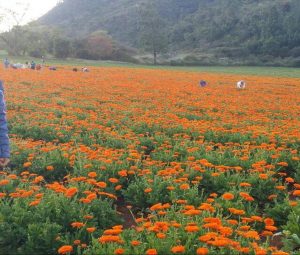
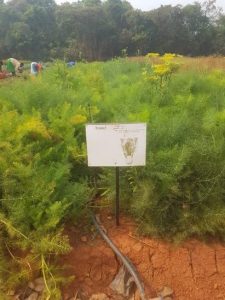
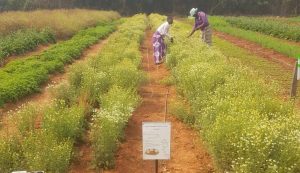

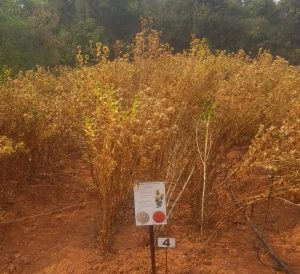
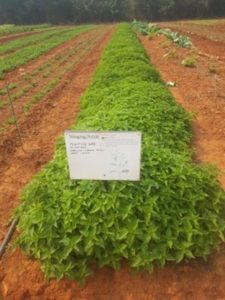


 USE NUMBER: 0775 907 595
USE NUMBER: 0775 907 595